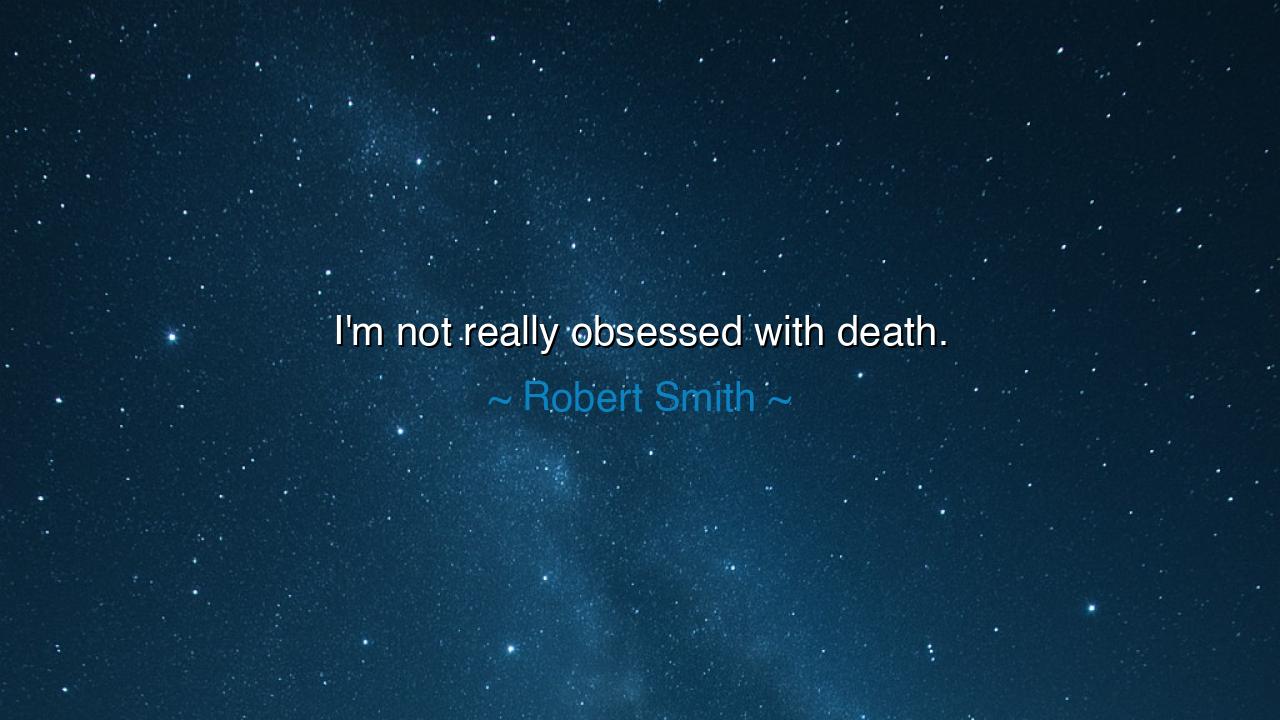
I'm not really obsessed with death.






In the quiet, deliberate words of Robert Smith, the enigmatic voice of The Cure, we find a paradox both haunting and tender: “I’m not really obsessed with death.” To those who have heard his songs—those aching hymns of longing, sorrow, and melancholy—this might seem an odd confession. Yet within it lies a profound wisdom. For Smith, the singer cloaked in black and shadow, death has never been the object of worship, but rather a mirror for life—its brevity, its beauty, and its fragile ache. His statement is not denial, but defiance. He is saying: I do not seek death—I seek meaning. I am not obsessed with the end; I am enthralled by what burns before it.
Robert Smith, born in England in 1959, became one of the defining voices of post-punk and gothic rock. His music, drenched in atmosphere and introspection, often explores love, loss, and mortality. Yet, when he says he is not obsessed with death, he rejects the misunderstanding that sadness is worship of despair. What he embodies instead is the acceptance of darkness as part of light. He gazes into the void not to surrender to it, but to understand it—to remind himself and others that the shadows only have power because the flame of life burns so brightly against them. In this, Smith joins the long lineage of artists and philosophers who have stood at the edge of mortality not to fall, but to learn.
His words echo the teachings of the ancients who understood that to speak of death is to speak of life. The Stoics of old—Seneca, Marcus Aurelius, Epictetus—spoke often of death not out of obsession, but out of reverence. “Meditate on death,” they said, “so that you may truly live.” They taught that by facing the certainty of our end, we strip away trivial desires and see clearly what is essential: love, courage, virtue, and wonder. Robert Smith, in his own poetic way, carries this same torch. When he sings of sorrow, he is not courting oblivion; he is celebrating the miracle that we can feel at all. He is not obsessed with death—he is illuminated by the contrast it casts upon life.
Consider also the lives of those who, like Smith, have lived with death’s shadow close at hand yet turned it into a force for creation. The painter Vincent van Gogh, who suffered deeply, saw in every sunrise and field of wheat the pulse of divine existence. His art was not despair, but yearning—his brushstrokes were hymns of color against the gray of mortality. Or think of the poet Emily Dickinson, who wrote often of death not as a lover to be embraced, but as a teacher to be questioned. Through her quiet meditations, she revealed that the contemplation of the end can deepen one’s awe for the present moment. In such souls, as in Robert Smith, death is not an obsession—it is a lens through which life gleams more brightly.
When Smith says he is “not really obsessed with death,” he speaks, too, against the tendency of the world to mistake melancholy for despair. The modern age fears sadness, and thus misunderstands those who dwell within it. Yet the ancients knew that sadness, rightly held, is not a sickness but a form of wisdom. To grieve, to reflect, to acknowledge mortality—these are not signs of darkness, but of depth. For only those who have looked into the abyss can truly cherish the light that remains. In this, Smith becomes not merely a musician, but a philosopher of the heart—a teacher who reminds us that to feel deeply is not to be lost, but to be profoundly alive.
There is a quiet heroism in this stance. To deny death is folly, but to obsess over it is bondage. The wise soul, as Smith teaches, walks the narrow path between. They do not avert their gaze from mortality, for that would be denial; yet they do not kneel before it, for that would be surrender. Instead, they use it as a measure of value, a reminder that every fleeting breath, every fragile act of love, matters infinitely because it will one day end. This balance—the courage to look upon death without worshiping it—is the heart of true freedom.
So, my children of the living world, learn this lesson: do not fear death, and do not love it. Instead, let it awaken you. Let it remind you to speak kindness before silence comes, to create beauty before your hands grow still, to love fiercely because the hour is short. When the thought of death visits you, welcome it not as a master, but as a messenger. Hear it whisper, “Live now, for there is no later.” Then rise, as Robert Smith does, and live not in obsession with endings, but in reverence for all that blooms before them. For the wise do not dwell in the grave—they dance at its edge, alive with the fire of knowing how precious each moment truly is.






AAdministratorAdministrator
Welcome, honored guests. Please leave a comment, we will respond soon